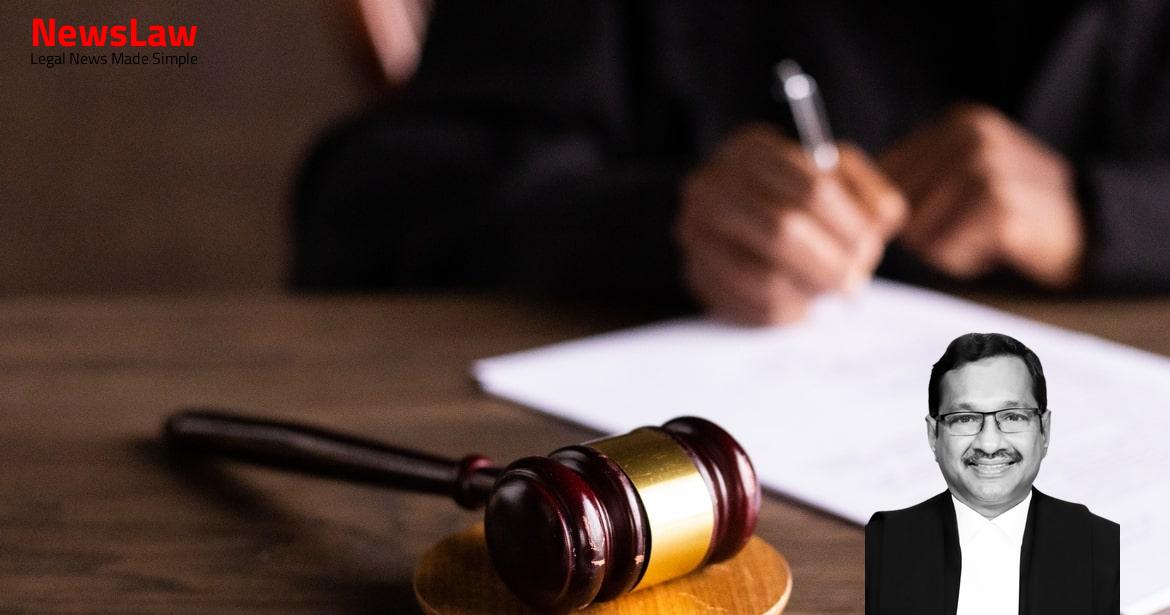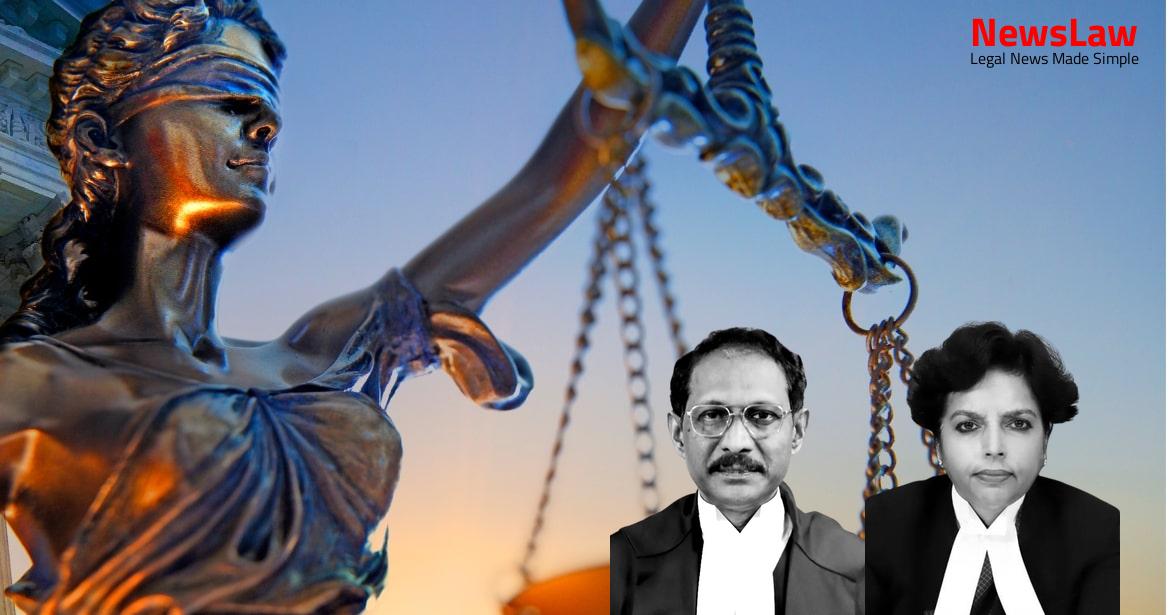The Supreme Court recently revisited the issue of authorization under Section 196-A of CrPC, 1989 in a significant legal case involving NIA and the respondents(Owais Amin). The judgment delves into the complexities of procedural laws and the necessity for proper compliance. Stay tuned for a detailed overview of the case and the implications of this ruling.
Facts
- The Special Judge, NIA concluded that no cognizance can be taken for certain offences as procedure under Section 196-B of CrPC, 1989 was not followed.
- The High Court held that the complaint was in accordance with Section 4(1)(e) of CrPC, 1989 and no mandatory preliminary investigation was required under Section 196-B of CrPC, 1989.
- The High Court upheld the finding on authorization under Section 196-A of CrPC, 1989 after being satisfied by the officer’s explanation.
- The High Court remitted the case back to the Special Judge, NIA for further consideration on offences under Sections 306 and 411 of RPC, 1989 and Section 39 of UAPA, 1967.
- The appeal is against the judgement of the Division Bench confirming the Special Judge’s decision partially and remitting certain charges for fresh cognizance.
- A complaint dated 20.09.2019 was received from the District Magistrate, Ramban, following Sections 196 and 196-A of CrPC, 1989.
- The case was registered against the respondents for various offences under different sections of RPC, 1989, Explosive Substances Act, 1908, UAPA, 1967 and Jammu & Kashmir Public Property Act, 1985.
- Cognizance was not taken for the offence under Section 120-B of RPC, 1989 due to lack of authorization and empowerment under Section 196-A of CrPC, 1989.
- The Special Judge, NIA entertained arguments from the respondents during the proceedings.
- Both the appellant and the respondents appealed against the decision of the Special Judge, NIA.
- The appellant re-registered the case as RC-03/2019/NIA/JMU on 15.04.2019 following an order by the Ministry of Home Affairs.
- The respondents were charge-sheeted for various offences related to attempting to ambush and ram a convoy of CRPF personnel with a car laden with explosives.
Also Read: Understanding the Supreme Court Judgment in Criminal Appeals: Yogesh @ Sonu Tharu vs. The State
Arguments
- The appellant’s counsel argued that the judgment should be set aside due to the enactment of the Act, 2019.
- The respondents’ counsel contended that the impugned judgment correctly applied the legal position at the time when the complaint was conveyed under the CrPC, 1989.
- Retrospective application of procedural laws was discussed, emphasizing that the procedure cannot be made retrospectively applicable.
- The Act, 2019 does not specifically mention the retrospective application of the CrPC, 1973.
- Section 103 of the Act, 2019 and Order, 2019 were referred to, highlighting the need to apply CrPC, 1989 based on non-compliance recorded by the Court.
- The arguments of both sides were presented, with the appellant pushing for setting aside the judgment and the respondents advocating for sustaining the impugned judgment.
Also Read: Supreme Court Judgement: State vs. Environmental Conservation Society
Analysis
- Section 120-B of the RPC, 1989 is akin to Section 120B of the Indian Penal Code, 1860, dealing with conspiracy.
- The Criminal Procedure Code, 1989 was repealed from 31.10.2019.
- CrPC, 1973 cannot be applied retrospectively, as per Act, 2019 and Order, 2019.
- Section 103 of the Act, 2019 empowers the President to resolve difficulties in implementing the new laws.
- An investigation begun in CrPC, 1989 can continue post-repeal under the old law.
- The necessity for authorization or empowerment for filing a complaint is crucial, even if done after investigation completion.
- Trial continuation for offenses needing sanction cannot be separated from those not requiring it.
- Justice Mukherjee allowed prosecution to proceed under Section 196A of CrPC, 1898 in a specific case.
- Non-compliance with Section 196-A of CrPC, 1989 led to convictions being set aside by the court.
- Investigating agencies can rectify omissions after completion by following the repealed CrPC, 1989.
- The Act, 2019 came into force on 31.10.2019, replacing the old laws.
- Table 3 of the Fifth Schedule allowed investigations ongoing during the law change to be governed by CrPC, 1989.
- Authority failures to provide sanction cannot be rectified by upholding convictions under different sections.
- The law’s application must align with the appointed day, not be retrospective.
- Section 196 and 196-A differences in the authority to convey complaints under CrPC, 1989 were highlighted.
- The CrPC, 1973 took effect from the appointed day, repealing CrPC, 1989.
- Order, 2019 under Section 103 of Act, 2019 preserved existing laws under specific circumstances.
- Laws would continue as if Act, 2019 had not been passed, under Para 2(13) of Order, 2019.
- Prosecution against the accused was revoked as authorization under Section 196-A was lacking.
- Central Laws’ application to J&K and Ladakh was clarified under Section 95 of the Act, 2019.
- The necessity of getting proper sanction or empowerment under Section 196-A of CrPC, 1989 was emphasized.
- Clear non-compliance with CrPC, 1989 requirements cannot be ignored when transitioning to CrPC, 1973.
- Section 196 of CrPC, 1989 mandates that jurisdictional court can take cognizance only upon a complaint made by the order of the Government or specified authorities.
- Section 196-A of CrPC, 1989 deals with conspiracy relating to illegal acts or offenses, requiring compliance with the specified procedure for taking cognizance.
- The Jammu & Kashmir Reorganisation Act, 2019 applies Central laws to the Union Territory of Jammu and Kashmir and Union Territory of Ladakh.
- Section 103 of the Act, 2019 grants power to the President to remove difficulties in implementing the provisions of the Act within a specified timeframe.
- The High Court of Calcutta considered a case from 1929 involving Nibaran Chandra and the Emperor.
- The case was reported in the 1929 A.I.R. Calcutta 754.
- The specific issue dealt with in this case is referenced as ‘Pre-Relied.’
- The impugned judgment is inclined to set aside the decision of the Special Judge, NIA, regarding the offence punishable under Section 120-B of the RPC, 1989.
- There is a need to reconsider the judgment in this specific aspect.
- The decision to not take cognizance for the offence mentioned under Section 120-B needs to be revisited.
Also Read: Judicial Review in Recruitment Processes
Decision
- The appeal has been allowed in part.
- Any pending applications have been disposed of.
- The appellant has been granted liberty to comply with the mandate of Section 196-A of the CrPC, 1989, by seeking appropriate authorization or empowerment.
Case Title: NATIONAL INVESTIGATION AGENCY NEW DELHI Vs. OWAIS AMIN @ CHERRY (2024 INSC 447)
Case Number: Crl.A. No.-002668-002668 – 2024



